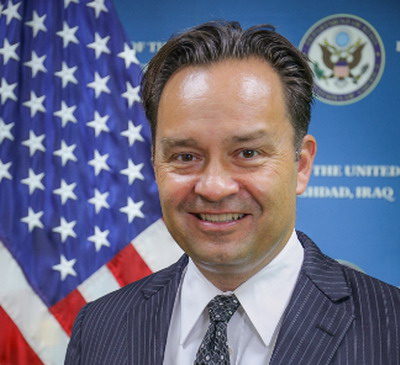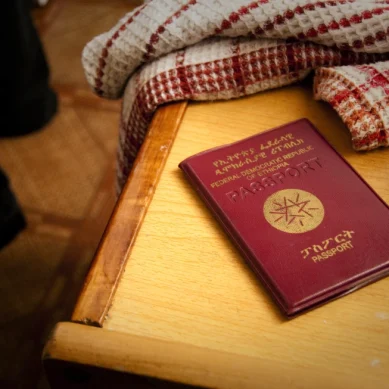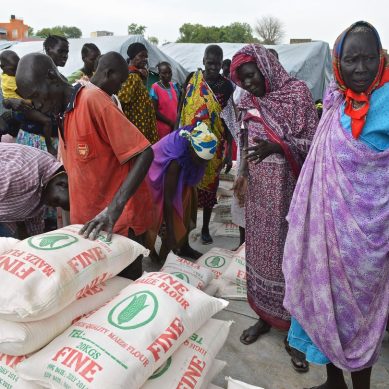
The United States is deeply concerned by multiple crises in the Sahel: security, humanitarian and political, “crises which are causing a dramatic increase in the strength and influence of violent extremism.”
So said the United States Deputy Representative to the United Nations, Ambassador Richard Mills, at the United Nations Security Council on January 10. Mills is worried that security threats are extending into coastal West Africa.
Violent extremism thrives when state authorities are absent; when the delivery of services is weak; when democracy is fragile or fleeting; when justice is inaccessible; and when economic and political exclusions prevail.
“And we also cannot ignore the fact that the Kremlin-backed Wagner Group is interfering in African countries’ internal affairs, robbing them of their resources, committing human rights abuses, and endangering the safety and security of peacekeepers and UN personnel,” Mills said, adding that “its presence and operations are not only failing to address the immediate violent extremist threat, but actually increasing the likelihood violent extremism will grow.”
He called for countries to return to civilian control. In his remarks, he said, “We strongly condemn the killing of 28 people in northern Burkina Faso in late December and we will continue to engage with the transitional government to strengthen protections for human rights and civil liberties, and we will support accountability for human rights violations and abuses.”
The US is also worried about the French Ambassador to Burkina Faso being asked to leave the country.
In his remarks to the UNSC, Ambassador Mills said about Mali, “The government must eliminate all restrictions against MINUSMA so that that operation can effectively carry out the mandate this Council authorised, which includes protecting civilians, promoting human rights, and advancing peace and stability in Mali.”
Last month, defenceWeb conducted a one-on-one interview on the US perspective on the Sahel and Maghreb’s geopolitics in Africa as it relates to counterterrorism and violent extremism, at the US-Africa Leaders’ Summit in Washington, speaking to Deputy Coordinator for Regional and Multilateral Affairs in the Bureau of Counterterrorism, Gregory LoGerfo. He said, “We have to focus on the Sahel because it is there in the Sahel where some of the most vicious and dangerous terrorists are moving.”
Here’s a brief excerpt on some ways in which the ways US has approached counterterrorism on the continent of Africa.
Pearl Matibe: What are the challenges in the Sahel? What are the successes, if any?
Gregory LoGerfo: “The Sahel is obviously a diverse region; we’ve partnered with lots of countries, lots of partners. My Bureau [the State Department’s Bureau of Counterterrorism] has focused on civilian security. We’ve worked with partners on border security, aviation, helping with tactical units that can respond to terror threats, again on the civilian side. The countries that I visited – Niger, Mali, Burkina Faso, and Mauritania – are [part of the] Sahel countries, but they are also connected with the Maghreb. These are two regions that intersect. We have to focus on the Sahel because it is there in the Sahel where some of the most vicious and dangerous terrorists are moving.
Pearl Matibe: Some say the US is treading a thin line between its excellent relations with Morocco while rebalancing or reshaping its relationship with Algeria, Tunisia, and the Maghreb. Critics say that the US has relied on France as the de facto country performing what the US should have done in the Sahel. Can you comment or provide some context?
Gregory LoGerfo: The Maghreb is a fascinating region. Over the years there have been concerns about safe migration, terror concerns in Libya, terrorism concerns in Tunisia in 2015. We do have great partners across North Africa. In 2016, for example, Tony Blinken, as [then] deputy secretary of state, met with the Arab Maghreb Union foreign ministers, on the margins of UNGA, and we talked at that time about the threat of out-bound foreign fighters.
We talked about economic development in that area, and it is something that we are continuing to work on today. With respect to the Sahel, we are a reliable partner; we have partnered with Niger and countries down into coastal West Africa. I met the foreign minister of Togo, Mr Robert Dussey yesterday [13 December 2022].
Great conversation, not just our bilateral partnership, but also the need for regional cooperation. I think that one of the things that our strategy on counterterrorism, in working with our partners, is really to encourage collaboration and sharing of resources, certainly of information, we saw the benefits of this kind of cooperation when stressed by things like Covid-19.
Over the long-run, capacity building is absolutely critical. I want to say, and make clear, we’re a reliable partner on the continent. We have built this counter-ISIS coalition and been very active on counter terrorism especially since 9/11, of course. We are going to make sure that we’re successful on the continent as we have been in the past.
Pearl Matibe: What do you want African audiences to know? What might that be?
Gregory LoGerfo: America is a reliable, genuine, committed partner. And, we understand, that if you look at the future of the African continent, if the continent is prospering and secure, it means great things for the entire world as well. And we know that.
We know that working closely with governments which demonstrate good governance, as Secretary Blinken said yesterday, that good governance in the long run leads to good security – and this is something we’re hearing African leaders and African people say that they want.
US Secretary Antony Blinken also summed it up this way: “Earlier this year in South Africa, I had an opportunity to set out the administration’s Strategy for Africa. At its core, it really can be distilled to a single word: partnership. The reality is that the United States and African nations cannot deliver on any of the fundamental aspirations of our people—we can’t solve any of the big challenges that we face — if we don’t work together. So our approach is about what America can do with African nations and people, not for them. And that’s what the US-Africa Leaders’ Summit has really been all about.”
- A Tell / Defenceweb report / By Pearl Matibe in Washington, DC











